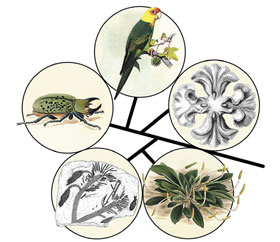|
This is an archived article.
For the latest news, go to the
Advance Homepage
For more archives, go to the Advance Archive/Search Page. | ||
|
Study Of Biodiversity Crucial The diversity of natural species is linked to a sustainable global economy, and the study of biodiversity can help promote both, says a former secretary of the National Academy of Sciences.
Peter Raven, director of the Missouri Botanical Garden and a former NAS secretary, spoke December 5 during a dedication ceremony for the new biological collections facility in the Biology/Physics Building. "Biodiversity is of fundamental importance to our common future," he said. "The decision of UConn to support studies in biodiversity will be revealed more and more as a wise one that positions you well for the future." He said worldwide population growth; increasing consumption, especially in developed countries; and unsustainable technologies have destroyed natural habitats and threatened many species with extinction. "Many of the actions we take now amount to stealing from future generations," Raven said. "We are consigning our children and grandchildren to a world less beautiful, less healthy, and less sustaining than the world we have right now." In the past 50 years, he said, the world's population has increased by 2.5 billion people to 6.3 billion. People in developed countries not only live in affluence, he said, but operate as if increasing levels of consumption are their due, while half the world's people live on less than $2 per day. Half the world's population is malnourished and one in eight people are starving, he added. Current technologies exacerbate the situation, he said. It is estimated that human beings are using the world's natural productivity at 120 percent of its sustainable capacity. Raven said it is essential to create a sustainable society that will go on fulfilling the needs of the world's population in the future. Massive changes have taken place in the environment in the past half-century, he said: "We are treating the world as if it were a business in the course of liquidation." The current approach to managing the earth's resources cannot be sustained, he said, yet no comprehensive plan has been developed to address the problems, and in most cases the underlying causes are continuing. "The more we use up resources, the less room is available in the world for biodiversity," Raven said. He said scientists do not currently know how many kinds of organisms there are. It is estimated there are 7 to 13 million species of eukaryotic organisms (a group that excludes bacteria, of which there are millions more species), yet only one in six organisms in the world has even been given a name, far less studied. Many species are already extinct or threatened, because their habitats have been destroyed or invaded by alien species. Raven said if a habitat is reduced to one-tenth of its earlier size, then about half the organisms in it are endangered. "Human beings' knowledge of natural species will inform our ability to create a sustainable world," he said, yet the study of biodiversity, of its genetic underpinnings, and of how individual species function in ecosystems, is still in its infancy. Two-thirds of the species on earth are projected to become extinct or endangered over the next 200 years, however. That is similar to the extinction rate at the end of the Cretaceous period, he said, when dinosaurs "bit the dust," as he described it, and the character of life on earth was changed for a period of 5 to 10 million years. Such a massive loss of species will have a major impact on humans, he said. All the foods on which human beings rely come directly or indirectly from plants. Medicines, too, are either natural products or derived by analogy with natural products. "How can we rebuild ecosystems with so little knowledge of how they function and how species function in them?" he asked. He urged those who want to preserve biodiversity to become educated about the issues and engage in the political process. Raven said Americans must also pay attention to their own standard of living. "We consume on average twice as much energy per capita as in Germany, Sweden, Switzerland, Norway," he said. "We must think about where we live, for example, and how far we go to work." Universities also should adopt environmentally appropriate technologies , provide outreach to the community, and ensure that all undergraduates take at least one course in environmental sciences, he said. Biological collections have an important role to play in helping document and understand biodiversity and the impact of invasive species, Raven said. "We must put our children and grandchildren in a position to cherish what we have enjoyed," he said. "Only by doing so can we ensure peace throughout the world and social justice for people everywhere." |

